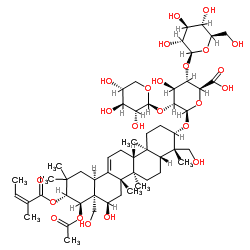Escin IIb
Modify Date: 2025-08-20 09:38:28

Escin IIb structure
|
Common Name | Escin IIb | ||
|---|---|---|---|---|
| CAS Number | 158800-83-0 | Molecular Weight | 1101.231 | |
| Density | 1.5±0.1 g/cm3 | Boiling Point | 1111.9±65.0 °C at 760 mmHg | |
| Molecular Formula | C54H84O23 | Melting Point | N/A | |
| MSDS | N/A | Flash Point | 305.5±27.8 °C | |
Use of Escin IIbEscin IIb, isolated from horse chestnut, the seeds of Aesculus hippocastanum L., has positive effects on acute inflammation in animals[1]. Escin IIb showed potent protective effects against ethanol-induced gastric mucosal lesions[2]. |
| Name | 06035642G6 |
|---|---|
| Synonym | More Synonyms |
| Description | Escin IIb, isolated from horse chestnut, the seeds of Aesculus hippocastanum L., has positive effects on acute inflammation in animals[1]. Escin IIb showed potent protective effects against ethanol-induced gastric mucosal lesions[2]. |
|---|---|
| Related Catalog | |
| In Vivo | Escins Ia, Ib, IIa, and IIb (50-200 mg/kg) inhibit the increase of vascular permeability induced by both acetic acid in mice and histamine in rats. Escins Ib, IIa, and IIb (50-200 mg/kg) also inhibit that induced by serotonin in rats, but escin Ia didn't. Escins Ia, Ib, IIa, and IIb (200 mg/kg) inhibit the hind paw edema induced by carrageenin at the first phase in rats. Escin Ia (200 mg/kg) and escins Ib, IIa, and IIb (50-200 mg/kg) inhibit the scratching behavior induced by compound 48/80 in mice, but escin Ia was weakest[1]. Escin IIb (10-50 mg/kg; p.o.) potently inhibits ethanol-induced gastric mucosal lesions[2]. Animal Model: Male Sprague–Dawley rats (Ethanol-induced gastric mucosal lesions in rats)[2] Dosage: P.o. Administration: 10-50 mg/kg Result: Showed a potent protective effect against ethanol-induced gastric lesions in rats. |
| References |
| Density | 1.5±0.1 g/cm3 |
|---|---|
| Boiling Point | 1111.9±65.0 °C at 760 mmHg |
| Molecular Formula | C54H84O23 |
| Molecular Weight | 1101.231 |
| Flash Point | 305.5±27.8 °C |
| Exact Mass | 1100.540283 |
| LogP | 4.87 |
| Vapour Pressure | 0.0±0.6 mmHg at 25°C |
| Index of Refraction | 1.624 |
| (3β,16α,21β,22α)-22-Acetoxy-16,24,28-trihydroxy-21-{[(2Z)-2-methyl-2-butenoyl]oxy}olean-12-en-3-yl β-D-glucopyranosyl-(1->4)-[β-D-xylopyranosyl-(1->2)]-β-D-glucopyranosiduronic 
acid |
| 2-Butenoic acid, 2-methyl-, (3β,16α,21β,22α)-22-(acetyloxy)-3-[[O-β-D-glucopyranosyl-(1->4)-O-[β-D-xylopyranosyl-(1->2)]-β-D-glucopyranuronosyl]oxy]-16,24,28-trihydroxyolean-12- 
en-21-yl ester, (2Z)- |
| (3β,16α,21β,22α)-22-Acetoxy-16,24,28-trihydroxy-21-{[(2Z)-2-methylbut-2-enoyl]oxy}olean-12-en-3-yl β-D-glucopyranosyl-(1->4)-[β-D-xylopyranosyl-(1->2)]-β-D-glucopyranosiduronic acid |
| 06035642G6 |
| MFCD10566615 |
| 2-butenoic acid, 2-methyl-, (3β,16α,21β,22α)-22-(acetyloxy)-3-[[O-β-D-glucopyranosyl-(1->4)-O-[β-D-xylopyranosyl-(1->2)]-β-D-glucopyranuronosyl]oxy]-16,24,28-trihydroxyolean-12-en-21-yl ester, (2Z)- |

